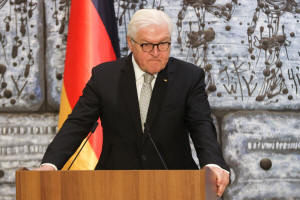|
"We
are experiencing a human tragedy for which we share
responsibility," said President Frank-Walter Steinmeier after
the Western-backed government in Kabul collapsed and its
foreign-trained security forces melted away.
Germany, which had the second largest military contingent in
Afghanistan after the United States, wants to airlift thousands
of German-Afghan dual nationals as well as rights activists,
lawyers and people who worked with foreign forces.
"The images of despair at Kabul airport shame the political
West," Steinmeier, whose post is largely ceremonial, said in a
statement at the German presidential palace Schloss Bellevue.
"All the more now we have to stand by those to whom we are
indebted for their work and support."
However, a first German military plane to land in Kabul
since the Taliban took power evacuated only seven people due to
the airport chaos after flying soldiers in on Monday.
"The Bundeswehr (army) is now securing access," Foreign Minister
Heiko Maas Maas tweeted, saying the situation at the airport had
stabilised and there would be further evacuation flights during
Tuesday.
ANOTHER MIGRANT CRISIS?
Germany is deploying 600 soldiers for that purpose.
Bild newspaper said a German military Airbus A400M had taken off
from Tashkent and was to land in Kabul early afternoon.
Chancellor Angela Merkel has warned that Afghans fleeing
to neighbouring countries could make their way to Europe, in a
repeat of the 2015 migrant crisis, if they do not receive
sufficient humanitarian assistance.
Germany opened its borders six years ago to more than 1 million
migrants, many of them Syrians, fleeing war and poverty: a move
that won Merkel plaudits abroad but which eroded her political
capital at home.
She plans to stand down after a Sept. 26 federal election.
Armin Laschet, the Christian Democratic Union (CDU) chairman
running to succeed her, called for future military interventions
abroad to have a clear goal, timeline and exit strategy.
"The lesson of the last 20 years is that the goal of regime
change, to intervene militarily to end a dictatorship in order
to build a democracy, has almost universally failed," he said in
Rostock in northern Germany.
(Additional reporting by Andreas Rinke in Rostock; Writing by
Emma Thomasson, Maria Sheahan and Paul Carrel; Editing by John
Stonestreet and Andrew Cawthorne)
[© 2021 Thomson Reuters. All rights
reserved.] Copyright 2021 Reuters. All rights reserved. This material may not be published,
broadcast, rewritten or redistributed.
Thompson Reuters is solely responsible for this content.

|
|




